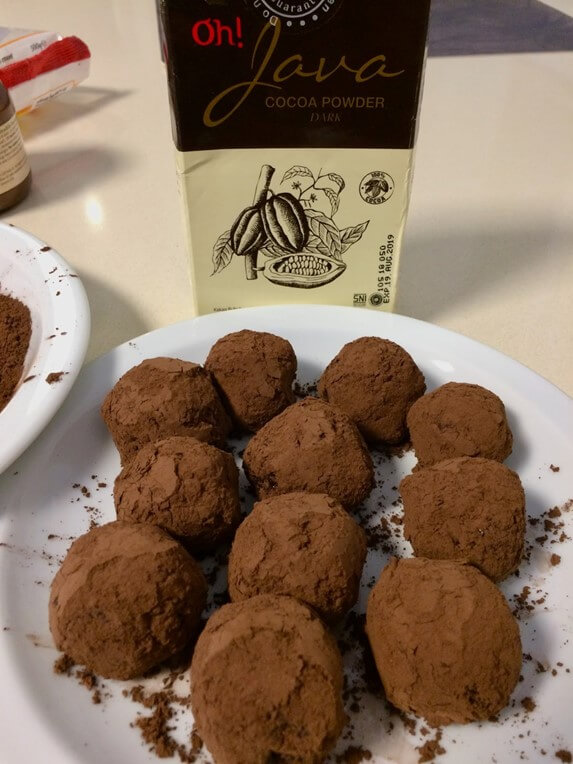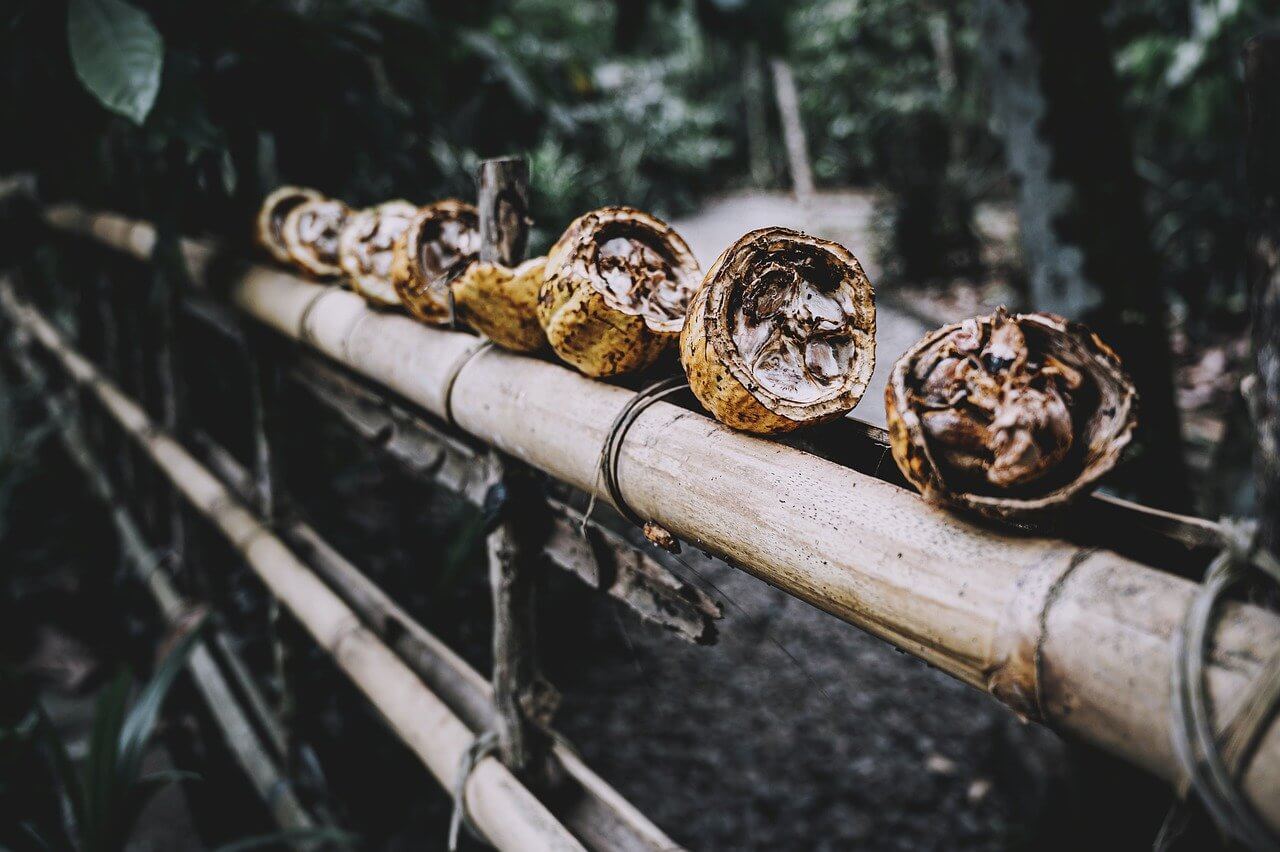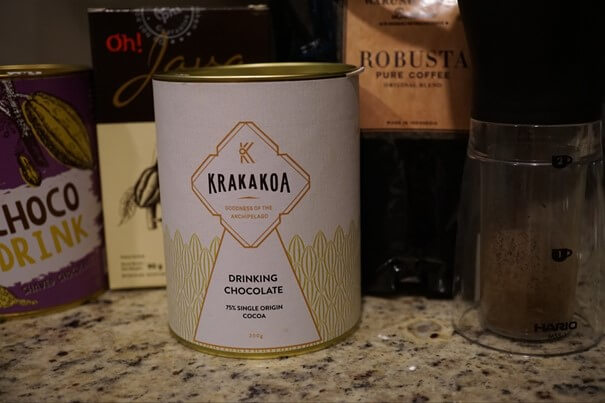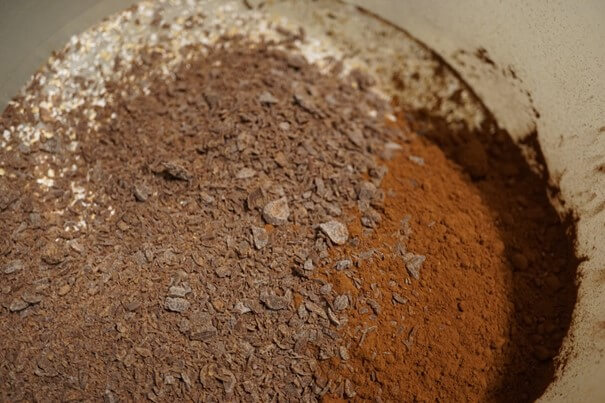Banana Chokladbollar using Indonesian cocoa powder from Java.
Source: Alaine Handa.
How often do you eat chocolate? A lot of the commercial mass produced chocolate we consume is owned by a handful of companies that dominate the industry. As a consumer, it has become even more important to know that the origin of that cup of hot chocolate or candy bar is not cultivated from illegal or unethical farming practices. In 2018, I wrote a cookbook on chocolate and began researching the origins of chocolate. One of the people within my personal network is Sabrina Mustopo, CEO and founder of Krakakoa chocolate. She sparked my own curiosity about sustainable and fair trade Indonesian chocolate. Coffee, tea, rice, palm oil, spices, and cacao beans are cultivated and exported out of Indonesia. Most cacao beans that are traded in the global market originate from Africa and South America, but Indonesia is the third-biggest trader of cacao beans and is a fast-growing market.
Indonesia’s tropical climate is perfect for cocoa bean trees to grow and ripen, so it's no wonder that cacao farmers choose to cultivate the crop. Currently there are approximately 1.5 million hectares of cacao plantations scattered across the archipelago. According to
Indonesia Investments, the main cocoa-producing region is on the island of Sulawesi—this region accounts for approximately 75% of the country’s total production. In 2009, the Indonesian government started a 5-year revitalisation program to boost cacao production in order to compete with the world’s leading cacao producers. Rapid growth in the industry is good for the economy, but it could also mean that small cacao farmers may be pressured into selling their cacao for less than its true market value price. If we continue supporting businesses dealing with unethical trade deals for cacao beans, the vicious cycle of poverty continues.
Cacao beans. Source: Martin Merenyi from
Pixabay.
What does it mean to purchase fair trade chocolate?
Fair trade chocolate helps farmers receive a steady and living wage for their hard-earned work. To receive fair trade certification, producers and businesses have to measure up to strict labor laws, minimize their environmental impact, and prohibit the use of child or slave labor.
I recommend watching the documentary film “
Bitter Chocolate” to understand why it is so important to support local businesses that work for more sustainable and fair trade chocolate. This documentary is an in-depth look at the chocolate industry and the unethical use of slave labor conditions, illegal farming on national parks, and unfair prices given to the farmers who work under cooperatives in Africa. Though this movie does not investigate the Indonesian cacao industry, it is very eye-opening and highlights the imperative that we, as consumers, should pay attention to the origins of our favorite sweet treat.
Consumers are becoming more and more savvy when it comes to making sustainable choices, and a small group of entrepreneurs have been rising to meet the challenge of creating a direct bean-to-bar chain for Indonesian chocolate. However, most of the country’s cacao is still
exported in its raw form and processed in other countries. To combat this, the government created incentives for more homegrown Indonesian cacao processing, thus creating a marketplace for entrepreneurs to process the raw cocoa beans into finished chocolate products. Several of these companies mentioned below are doing just that.
Indonesian cocoa powder from Pipiltin cocoa, Krakakoa chocolate, and Java cocoa paired with Indonesian Robusta coffee. Source: Alaine Handa.
“Our mission is to put our beliefs into action and change the way food production systems impact people and the planet, starting with cocoa.”
One of the reasons why this article exists in the first place: I had picked up a canister of Krakakoa’s cocoa powder to use in my baking, and from then became interested in finding out more about the company. I reached out to Sabrina Mustopo, CEO and founder of Krakakoa. We continued our correspondence, and she eventually wrote the foreword for my cookbook. Mustopo saw a need in the farmer-to-producer relationship in Indonesia and created Krakakoa chocolate in 2013. She worked tirelessly with small farmers and gained their trust to create chocolate products that would be fair trade and sustainable.
Krakakoa’s mission for working directly with their farmers so that they receive education on best cacao bean farming practices and fair pay is paramount to their success as a small chocolate company.
In a recent interview, Mustopo told me her reasons for going into the chocolate business. and what she envisions for the future of Indonesian chocolate.
1) How did you get into fair trade artisanal chocolate in Indonesia?
“I used to work as a management consultant looking into sustainable economic development and agriculture, and I saw a need to provide farmers with training and better prices to increase the quality, quantity and sustainability of their production. While there have been government programs and NGOs who are working on this, there was a need for private sector involvement that looked after the interest of the farmers, so Krakakoa was set up with that in mind.”
2) According to market research, the interest in Indonesian cacao beans has been rising steadily. Where do you want to see the cacao industry in Indonesia develop?
“I'd like to see us focus more on quality and sustainability, which needs to start with better farming practices and incentives for farmers to grow beans that are better, in every sense of the word.”
3) Have you seen an interest in buying fair trade Indonesian chocolate with consumers and b2b (business-to-business) collaborations in the last five years?
“Yes, as an origin, Indonesia is not as widely known in the craft chocolate world, but there is growing interest in it. With regards for fair trade and sustainability, we definitely see it growing in importance, and it's something that's becoming a requirement for our customers.”
4) Any tips on what to look out for as a consumer to ensure that the chocolate purchased is fair trade?
“This is a difficult one, because labels are a quick and easy way for consumers to look at a product and see the value chain has been audited. However labels hide a lot of problems and it's been documented that oftentimes, these certification programs don't actually make any difference in the lives of farmers. If customers really want to make sure that the companies are benefiting smallholder farmers, look for those that publish their impact numbers, show what the price they pay for beans, provide transparency in their value chain and show that they work directly with farmers.”
The chocolate industry in Indonesia is still fairly new and mass produced chocolate by
big companies are still prevalent in many places. However, people like Sabrina Mustopo from Krakakoa are trying to trailblaze and change the Indonesian cacao industry through
education for the farmers and introducing consumers to high-quality chocolate products such as those for which Krakakoa is slowly becoming known. Other passionate individuals have followed suit, and have begun their journey into the world of artisanal Indonesian chocolate.
Some fair trade Indonesian chocolate brands to keep an eye on:
Tissa Aunilla and her brother Irvan Helmy started Pipiltin Cocoa because they saw a need in creating quality finished chocolate products that rival the finest chocolates found in Belgium and Switzerland, but using only high-quality Indonesian cocoa beans. They wondered why Indonesian cacao was mostly being exported outside of the country to be processed, and wanted to disrupt the chain by creating farm-to-bar high quality chocolate products in Indonesia.
Since 2010, Pod Chocolate has been making direct-trade chocolate out of their own chocolate factory based in Bali. Known for their high quality plant-based chocolate products, they also engage in direct partnerships with the farmers through education, consultation, and fair trade practices. This chocolate company has grown exponentially in the last decade. Their chocolates are made from better quality ingredients through the control they have over cacao to their use of unrefined sugar and plant-based milk alternatives, making them a leading vegan chocolate. Their factory is available for visits in Bali (perhaps when the pandemic is over this should be on your chocolate travel bucket list!)
Check out the cacao farm via Youtube.
Other chocolate artisanal brands I have found that are worthy to mention include
Mason Chocolates, a Bali-based chocolate company making artisanal bean-to-bar chocolates using quality Indonesian cocoa beans and the latest methods of chocolate making. Another is
Jika chocolate, a new-to-the-market bean-to-bar artisanal brand, committed to producing artisanal fair-trade Indonesian Chocolate. According to their website, they work through direct trades with farmers who cultivate cocoa beans in the Indonesian archipelago.
Cocoa powder. Source: Alaine Handa.
Despite the burgeoning local artisanal chocolate industry in Indonesia, a large part of cocoa beans are
still exported overseas and processed in the USA, Europe, and other countries in the Southeast Asian region. This is probably due to the fact that consumption of chocolate remains relatively
concentrated in richer countries. Most of the population of Indonesia are still priced out of being able to afford high quality chocolate products and will opt for cheaper mass produced industrial chocolate made by the industry giant companies and subsidiaries. These large conglomerates also have the capacities for worldwide distribution, but there are
a lot of artisanal fair trade chocolate producers that use Indonesian cacao. Even in Sweden, you can find Indonesian single-origin chocolate by small artisanal chocolatiers and specialty shops like Urban Deli in Stockholm and
Chokladshopen.
Personally, I like purchasing chocolate from local chocolate companies whether I am in Sweden, Europe, Australia, USA, or Southeast Asia as gifts. As consumers of chocolate we have a responsibility to know the source and whether fair trade practices in addition to the sustainability practices of the farmers are being practiced. Sometimes it is hard to find fair trade chocolate, yet a little bit of research goes a long way as well as supporting small businesses who are committed to fair trade chocolates.




